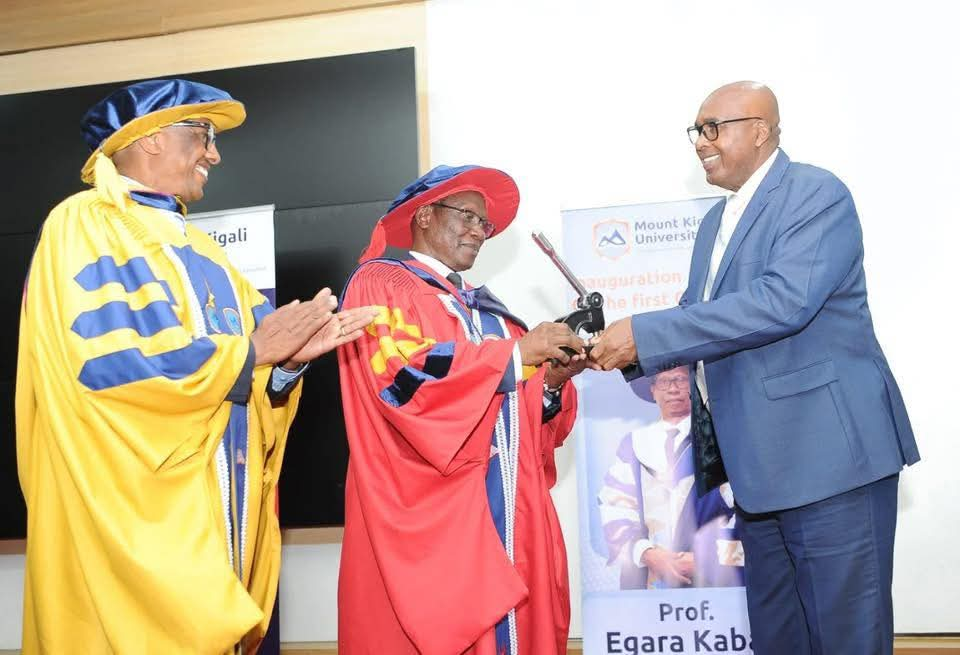There are moments when the continent pauses, not in surprise, but in recognition. Kigali witnessed such a moment yesterday, as intellect and grace converged beneath Rwanda’s rolling hills. Professor Egara Kabaji, Kenya’s distinguished scholar, literary craftsman, and educationist, was crowned Chancellor of Mount Kigali University, a celebration that resonated far beyond the walls of academia.
His appointment is more than an institutional honor. It is an affirmation of East Africa’s enduring faith in knowledge as a force of renewal. For decades, Professor Kabaji’s voice has echoed across classrooms, libraries, and literary gatherings, a voice that threads together the ideals of scholarship, creativity, and cultural identity.
To those who have read his works or sat in his lectures, Kabaji represents a rare fusion of intellect and humanity. He belongs to that lineage of African thinkers for whom education is not merely a profession but a moral project, an act of nation building that transcends borders and time.
I first encountered him in 2024 at Musoli Girls High School in western Kenya during a Book Harvesting Day, a humble yet powerful event that gathered teachers, students, and book lovers around a shared belief that stories shape societies. When Professor Kabaji rose to speak, the atmosphere shifted. His tone carried the warmth of a mentor and the conviction of a reformer. He spoke of education as a sacred trust, not simply a path to opportunity, but a means of reclaiming one’s voice in a world too often eager to silence it. His words lingered long after the applause had faded, like an echo of wisdom refusing to be lost in the wind.
Months later, through my colleague and publisher Mr. Barack Wandera, I joined the Kakamega Book Club, a sanctuary of readers and thinkers bound by the quiet energy of books. It was there, within the fellowship of ideas, that I came to know the man beyond the titles. Professor Kabaji’s presence was steady and unassuming, his curiosity endless. He listened deeply, asked questions that opened doors, and reminded us, without ever preaching, that true learning begins with humility.
When he stood before the audience in Kigali to assume his new role, his message was as timeless as it was urgent. Education, he said, remains the most powerful instrument of transformation. Universities, he reminded us, must not only produce graduates but nurture citizens, thinkers who act with courage, compassion, and clarity. His words carried the cadence of conviction, yet his tone was reflective, almost prayerful, the mark of a teacher who understands that knowledge is both light and burden.
Under his stewardship, Mount Kigali University seems destined to grow into more than a campus, into a crossroads of ideas where research, creativity, and cultural consciousness meet. His appointment feels symbolic of something greater, a continent quietly reclaiming its intellectual sovereignty, one institution at a time.
Beyond academia, Professor Kabaji remains a storyteller, one whose words have carried the light of African wisdom into spaces where it has too often been dimmed. His essays and books have defended the dignity of African narratives, reminding readers that our stories are not relics of the past but blueprints for the future. He has written of the African condition with the empathy of a humanist and the precision of a craftsman, challenging his readers to see literature not just as art but as moral architecture.
His coronation in Rwanda is, in that sense, poetic. It dissolves the lines of nationality and affirms a truth that Chinua Achebe articulated decades ago, that the African writer, like the African thinker, serves not one tribe or nation, but the larger story of the continent itself. In Kabaji’s journey, one sees this truth alive and renewed, the scholar as a bridge between people and purpose, between heritage and possibility.
In celebrating him, Mount Kigali University celebrates the continuity of African intellect, a lineage carried by those who teach, write, and lead with vision. The ceremony was not merely a formal installation; it was a gesture of faith in what African universities can become when led by men and women of conscience.
What stands out most about Professor Kabaji is not his long list of achievements, though they are many, but the quiet integrity that underpins them. In conversation, he is generous with his time and sparing with judgment. He speaks softly, but his words command reflection. His leadership, much like his prose, is deliberate, unhurried, and full of moral clarity.
As Mount Kigali University turns a new page under his watch, one senses a revival of the idea that education is a communal endeavor, that a university, in the African sense, is not just an ivory tower but a living space where values are cultivated alongside intellect.
His journey reminds us that knowledge, when anchored in purpose, becomes more than an individual achievement; it becomes a service to humanity. In an age where learning is often commodified and intellect politicized, Professor Kabaji’s example restores faith in the idea of education as a calling, one rooted in compassion, creativity, and conviction.
And for those of us who have listened to him, shared his vision, or drawn courage from his words, his ascension to the chancellorship feels deeply personal. It reminds us that the African scholar, at his best, is not merely a custodian of information but a custodian of hope, a keeper of the light that continues to burn across generations and borders.
By honoring Professor Egara Kabaji, Mount Kigali University honors more than a man; it honors a philosophy, that wisdom, when shared freely and carried humbly, is the surest path toward a more enlightened continent.
And in that torch he now carries, one sees the reflection of Africa itself ; radiant, resilient, and forever reaching toward the light.


Facebook Comments